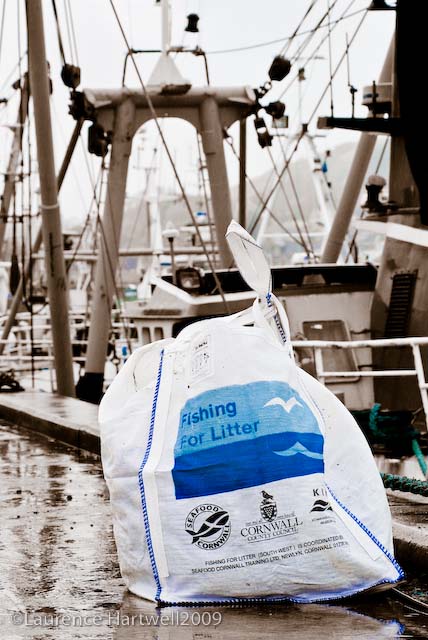The project provides vessels with large durable bags to collect marine litter. When full, these bags are deposited safely on the quayside, where the harbour authorities move them to a dedicated secure Fishing for Litter skip.
Fishing for Litter has been operational since March 2009, starting in Newlyn and steadily growing across South West ports to Brixham, Plymouth, Newquay, and Looe. A further four Cornish ports have just joined the project: St Ives, Mevagissey, Hayle and Padstow.
Alison Elvey de Rios, South West Fishing for Litter Coordinator commented, “It’s great that this innovative, simply executed project, has landed over 50 tonnes of marine litter. The project’s momentum is growing year on year, and more fishermen are getting involved to help clean our seas.” Millions of marine mammals, birds, turtles and fish perish as a result of entanglement or ingestion of deliberately or accidentally discarded debris. Therefore, participating fishermen, by helping to reduce marine litter, are making a vital contribution to the protection of the marine environment as a whole.
The Crown Estate’s Marine Stewardship Manager, Fiona Wynne said: “The Crown Estate is committed to supporting projects that help reduce the amount of litter in the marine environment. To have landed 50 tonnes of marine litter is a fantastic achievement for all involved in the project and with more ports and vessels signing up each year we are confident Fishing for Litter South West will continue to make a vital contribution to the protection of the marine environment.”
A Duchy of Cornwall spokesperson said: “We are delighted to see Fishing for Litter in Devon and Cornwall passing its 50 tonnes milestone – removing a significant volume of harmful waste from the seas around our coasts – and we praise the work of these fishermen, who are committed to preserving and enhancing the marine environment”. Items commonly landed include pieces of plastic and polythene, rope and cord, nets, bottles, rubber, metals and textiles. If not recovered, these items could eventually end up destroying ecosystems or littering the region’s beaches and shoreline, which could also impact on the regions tourism sector.
Councillor Edwina Hannaford, Cornwall Council Portfolio Holder for Environment, Heritage and Planning, agreed, “It’s wonderful to see the Fishing for Litter Partnership achieving excellent results, that is of real benefit to our maritime environment and to those who live and work alongside it. Cornwall’s beaches attract thousands of tourists each year, keeping them clean is very important; the waste collected by this project prevents it being washed ashore.” Dave Owens, Assistant Head of Environment & Waste Management at Cornwall Council, continued, “Cornwall Council has supported this programme from day one and it’s very rewarding to be part of this scheme, it’s great to see that the project is going from strength to strength.
The aim to add more ports and fishing vessels to the projects network will significantly increase the amount of marine and coastal litter removed from the seas.” Fishing for Litter Southwest is also supported and funded by The Department for the Environment, Food and Rural Affairs, Cornwall Council, The Cornish Fish Producers’ Organisation, Duchy of Cornwall, Esmée Fairbairn Foundation, Devon County Council and The Crown Estate, through the organisation’s Marine Stewardship Fund. In addition, this voluntary project also helps fishermen themselves as a recent KIMO study, by Hannah Bateson, on the Economic impacts of Marine Litter, showed the average yearly cost of marine litter to a fishing boat is £10,000, through contamination of catches, broken gear and fouled propellers.
Fishing for Litter forms part of the Fishing for Litter network run by KIMO, an international organisation of local authorities working to tackle marine pollution and environmental issues.
Notes to editors: The South West project is based upon Fishing for Litter Scotland which has been in operation since 2005. Fishing for Litter South West is coordinated by Alison Elvey de Rios from Seafood Cornwall Training Ltd.
For further information please contract Alison on 01736 364324 or alison@seafoodcornwalltraining.co.uk or check out the website on: www.fishingforlitter.org/FishingforLitterSouthWest.aspx
